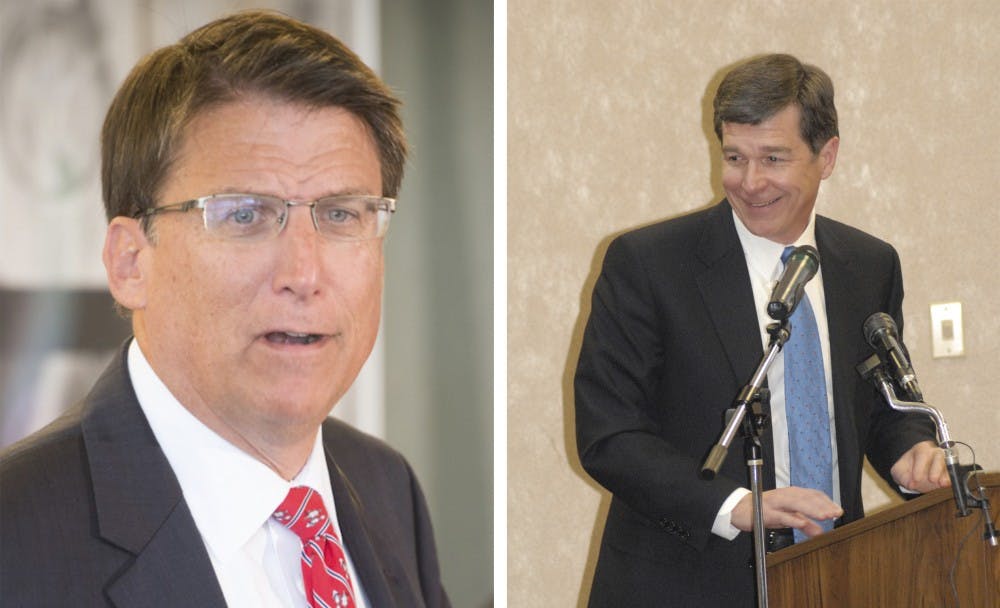The winner of the North Carolina gubernatorial race will not be decided until at least Nov. 18 because the razor-thin margin will require a thorough vote canvass, according to incumbent Gov. Pat McCrory.
According to the North Carolina State Board of Elections website at 2:13 a.m., the race for governor was separated by less than 0.11 percent, with all 2,704 precincts reporting and Democratic challenger Roy Cooper with a 5,001 vote lead.
Cooper—the state’s attorney general since 2001—has promised to repeal the controversial House Bill 2, which McCrory has defended during the course of the campaign. Sophomore Adam Bullock, Duke Student Government senator for equity and outreach, helped introduce a resolution condemning HB2 to the DSG Senate last year. Bullock said that he thinks Cooper will be able to overturn the legislation if elected.
“I am very confident that he will use his political utility to ensure that this will not continue to affect the economy and the civil rights of North Carolinians,” Bullock said.
First-year Mitchell Siegel, a self-identified Republican, said that he supported McCrory because he wants to support his party, although he is not completely in favor of HB2.
“I understand that the HB2 law is controversial, and I don’t support all parts of it, but if you look at his term in totality I think he has done a very good job with the state,” Siegel said. “I’m going to be living here for four years, and I’d like to have Pat McCrory in office. But if he loses I will move on with my life.”
However, HB2 was not the only issue on the minds of voters. North Carolina currently ranks 41st in the country for teacher pay—an issue that first-year Leah Abrams, a columnist for The Chronicle, said is critical to the future of the state. Abrams graduated from Carrboro High School in Carrboro, North Carolina, and said she cast her ballot for Cooper in part because of his education funding policy.
“I watched, over the last six years of my public school career, the deterioration of the public school system in this state,” she said. “It was terrible being a kid and seeing all of your teachers leave. It caused a lot of pain to my teachers, to students, to parents and to families all across the state. I feel really confident that Roy Cooper is going to redeem the reputation of North Carolina, because it hasn’t been good.”
Cooper won the Democratic nomination for the office by defeating former State Representative Ken Spaulding with a 37 percent margin. Cooper is one of 150 candidates President Barack Obama has endorsed during this election cycle, according to Ballotpedia.
In addition to attacking McCrory’s social policies, Cooper has campaigned on increasing teacher pay, cutting taxes for the middle class and expanding Medicaid. He has also stated his intention to allow online voter registration and roll back the state’s voter ID laws.
McCrory first took office in 2013, and he won this year’s Republican nomination in March with 81.7 percent of the votes over former state Rep. Robert Brawley and 2012 gubernatorial candidate Charles Moss.
McCrory has rejected focusing on social issues and “bathroom politics,” instead honing in on the fiscal success his administration has had. His campaign website claimed that 230,000 jobs were created and a $450 million budget surplus was accumulated during McCrory’s tenure.
Colin Duffy, junior and chair of the Duke College Republicans, said that he expects McCrory to come out victorious despite the uncertainty.
“I, personally, am a huge McCrory fan,” Duffy said. “I’m a little biased in this sense. I really do believe that Pat is going to win. I think that the down-ballot indicators are pointing that way as well.”
Get The Chronicle straight to your inbox
Signup for our weekly newsletter. Cancel at any time.
Bre is a senior political science major from South Carolina, and she is the current video editor, special projects editor and recruitment chair for The Chronicle. She is also an associate photography editor and an investigations editor. Previously, she was the editor-in-chief and local and national news department head.
Twitter: @brebradham
Email: breanna.bradham@duke.edu

